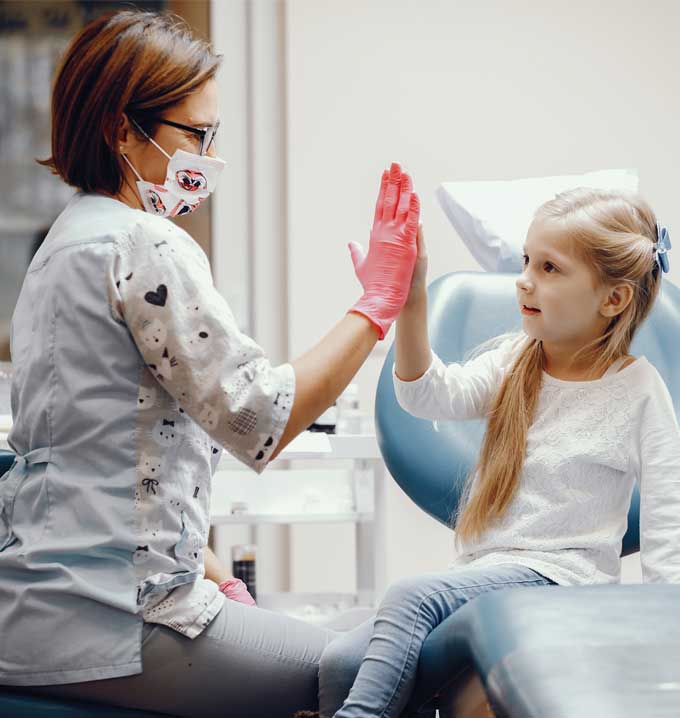Healthcare Provider Visit Tips
Visiting the doctor or dentist can be overwhelming for autistic children, especially those with sensory difficulties. We discuss choosing the right healthcare practitioner and how to prepare your child for their trip.

Tips for Taking Your Child to the Doctor’s Office or Dental Office
Going to see a healthcare professional can be a frightening experience for any child. Often, negative experiences in the past in any medical setting can set the tone for future visits, and it’s not unusual for children (and adults) to have fear and anxiety around going to see the doctor or dentist.
Having an autistic child further complicates the matter. Dentists, doctors, and autism are rarely a match made in heaven. However, with the right preparations in place and healthcare professionals who are experienced with autism, a dentist visit or doctor visit can be successful and less traumatic.
Let’s take a look at why autism and doctor’s visits or going to the dentist can be overwhelming and how you can prepare your child for these visits. We’ll also discuss how to choose the right doctors and dentists to ensure your child gets the necessary healthcare without the stress that usually comes with it.
What makes healthcare visits so difficult for autistic children?
While going to the doctor or dentist isn’t any child’s favorite activity, it can be completely overwhelming and traumatic for autistic children, and this makes it difficult for parents and caregivers, too.
Here are some of the more common aspects that make a visit to the doctor or dentist difficult for autistic children.
Sensory sensitivities
One of the most problematic areas that makes healthcare visits challenging is the unique sensory issues that most autistic children have. Everyday sensations can be overwhelming and uncomfortable, and this is merely exacerbated at the doctor or dentist.
Autism and the dentist rarely gel. Dental environments usually have big bright lights, high-pitched sounds of drills and suction machines, the sharp taste of fluoride, and more. Doctors’ offices are filled with chatter in the waiting room, the coldness of the stethoscope against the skin, bright lights shining into eyes, and wooden sticks on tongues.
All of this can be extremely triggering for an autistic child.
Difficulty adapting to change
Autistic children thrive with predictability and routines. A visit to a healthcare provider throws their daily routine out. To add complexity, the doctor or dentist could be new, which means a new environment, person, and possibly procedure in the mix. Additionally, no wait time is guaranteed, so excessively time waiting without activity can compound the already stressful situation.
Challenges with communication
Some autistic children have trouble communicating how they feel and what they need, want, or dislike. Many healthcare professionals rely on patient feedback to adjust their approach and will ask if something is uncomfortable or hurting so that they can try something different. This can cause unnecessary distress for the patient, parent, and healthcare professional.
Many of these appointments also require patients to follow instructions, such as “open wide,” “follow the light,” “bite down,” and so on. Autistic children may have trouble understanding instructions and need more time to process and respond to them.
The importance of choosing the right healthcare practitioner
One of the most important components of a successful trip to a healthcare provider is finding the right one for your child. Make sure that you do your research to find an autism-friendly dentist or doctor who advertises specifically for special needs patients.
How to talk to your doctors about autism? Just be honest. Don’t feel bad to ask to meet the doctor or dentist beforehand to ask them any questions you have and assess their experience with children with sensory sensitivities. Ask about their process and how they usually help to make the interaction with autistic children less traumatic.
Ask whether they will allow you to do a desensitization tour for your child before their appointment; the best doctor or dentist for autistic kids will have no problem with this. See whether they are willing to examine your child in the waiting room if they don’t want to go into the practice room.
As a parent or caregiver, your instincts should be able to point you in the right direction, and you’ll be able to judge in person whether a professional and the offices themselves are suited to your child.
It’s also important to book an appointment slot that will require as little waiting time as possible. This is normally the day’s first appointment, the first after lunch, or the very last of the day.
How to prepare your child for their visit to the doctor or dentist
Here are some of the most effective ways that you can prepare your child for their visit.
Familiarize them with the space
Prior to your child’s appointment, it is important to familiarize them with the space they will be visiting. Show them pictures of the doctor’s office or the dental clinic and children at their appointment. This shows them what to expect. If possible, it’s worth visiting the premises beforehand, meeting the staff, and getting your child familiar with the space and the people.
Use visual schedules and tell stories
Your child is used to their routine, and breaking this pattern can be challenging. However, using a visual schedule and social stories will help prepare them. This simple practice includes a detailed, step-by-step explanation of what they can expect from when they leave home until they return. Remember to use clear, concise language or pictures to get this across. Repeat the story regularly in the build-up to the appointment.
Play dentist or doctor at home
Play is one of the best ways for children to learn, and demonstration is particularly important for autistic children. Play dentist with your child. Put on some gloves and touch their teeth with your hands or a toothbrush and get them used to the sensation of having someone touching their mouth.
Invest in a medical play set and practice getting your child used to the stethoscope against their skin, a light in their eyes, and a tongue depressor (or popsicle stick) on their tongue, etc.
Play is one of the most effective ways to create familiarity with the process.
On the day
The day of the appointment is here, and you’ve prepared your child as much as you can, so what now? First, it’s important to remind your child of the plans for the day as early as possible and repeat the visual story of what they should expect.
Pack essential sensory items that your child might need or want, such as noise-canceling headphones and sunglasses. Take their favorite toy, blanket, and book with them, too. Keeping them entertained while they wait is important.
Keep in mind that you shouldn’t force your child to do anything if they don’t want to. While healthcare is crucial, sometimes you might need to try on another day. If your child gets incredibly anxious and wound up in the waiting room and refuses to go into the medical rooms, then it’s worth seeing if they can be seen in the waiting room or booking an appointment for another day.
Remember, you don’t want this to be traumatic, as it could impact future visits.
At LAC, we prepare your child for these important interactions
At Lighthouse Autism Center, we know that planning for changes in your child’s life is crucial, and visits to healthcare providers are often challenging. That’s why we help you navigate these delicate processes and equip you and your child with the tools they need for these interactions.
Our innovative programs like Lighthouse Fusion ABA Therapy and the wide array of autism resources on the website are among the best ways to give your child the future they deserve.
Together, we can unlock your child’s potential
Related News

06/11/2025
Overcoming Stereotypes
Autism stereotypes are common and can have significant social consequences for autistic children. Misconceptions hinder the acceptance and inclusion of autistic children. Challenging these stereotypes is vital for creating a more understanding and supportive society. Challenging Common Autism Stereotypes When people hear the word “autism,” they often imagine a narrow set of images, like the […]

06/11/2025
What’s Next After ABA Therapy?
There are a number of reasons why an autistic child might stop ABA therapy, and one is that they have reached their goals. In this article, we take a look at what parents can expect going forward. What Are the Next Steps After ABA Therapy? As a parent, you only want what’s best for your […]

06/11/2025
Do Babies with Autism Smile?
We take a look at the importance of early intervention, some of the milestones for parents to look out for, and the more common signs of autism in babies. Do Babies with Autism Smile? Watching your baby grow is an exciting time, certainly one of life’s quiet wonders. From those first sleepy stretches to the […]


